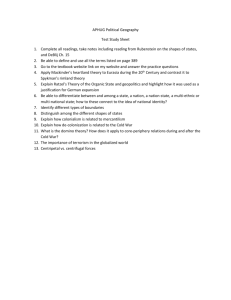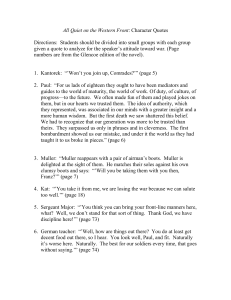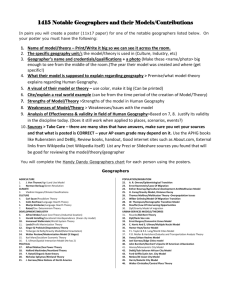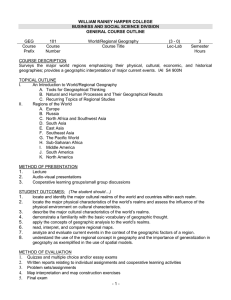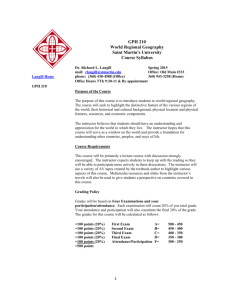Session: Fall 2004 Prof.: Dr. Jean-Paul Rodrigue
advertisement
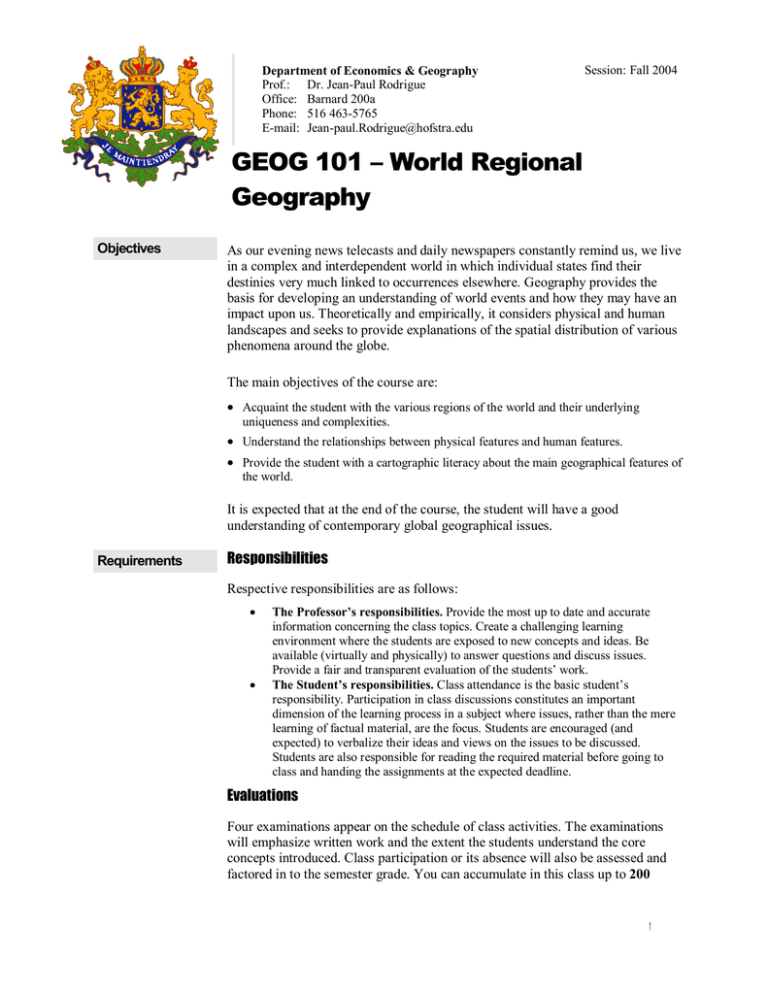
Department of Economics & Geography Prof.: Dr. Jean-Paul Rodrigue Office: Barnard 200a Phone: 516 463-5765 E-mail: Jean-paul.Rodrigue@hofstra.edu Session: Fall 2004 GEOG 101 – World Regional Geography Objectives As our evening news telecasts and daily newspapers constantly remind us, we live in a complex and interdependent world in which individual states find their destinies very much linked to occurrences elsewhere. Geography provides the basis for developing an understanding of world events and how they may have an impact upon us. Theoretically and empirically, it considers physical and human landscapes and seeks to provide explanations of the spatial distribution of various phenomena around the globe. The main objectives of the course are: • Acquaint the student with the various regions of the world and their underlying uniqueness and complexities. • Understand the relationships between physical features and human features. • Provide the student with a cartographic literacy about the main geographical features of the world. It is expected that at the end of the course, the student will have a good understanding of contemporary global geographical issues. Requirements Responsibilities Respective responsibilities are as follows: • • The Professor’s responsibilities. Provide the most up to date and accurate information concerning the class topics. Create a challenging learning environment where the students are exposed to new concepts and ideas. Be available (virtually and physically) to answer questions and discuss issues. Provide a fair and transparent evaluation of the students’ work. The Student’s responsibilities. Class attendance is the basic student’s responsibility. Participation in class discussions constitutes an important dimension of the learning process in a subject where issues, rather than the mere learning of factual material, are the focus. Students are encouraged (and expected) to verbalize their ideas and views on the issues to be discussed. Students are also responsible for reading the required material before going to class and handing the assignments at the expected deadline. Evaluations Four examinations appear on the schedule of class activities. The examinations will emphasize written work and the extent the students understand the core concepts introduced. Class participation or its absence will also be assessed and factored in to the semester grade. You can accumulate in this class up to 200 1 points, which is broken down as follows: • Four examinations. 45 points each. • Participation. 20 points. The lowest examination grade will be dropped in exchange for the second lowest grade. For instance, if you elect not to take the second examination, this grade (zero) will be replaced by the lowest grade of the three other examinations. However, everyone must take the final examination. Grades To successfully complete this class, you need to accumulate 110 points: (A) 190 points and above. (C) Between 130 and 139 points. (A-) Between 180 and 189 points. (C-) Between 120 and 129 points. (B+) Between 170 and 179 points. (D+) Between 116 and 119 points. (B) Between 160 and 169 points. (D) Between 110 and 115 points. (B-) Between 150 and 159 points. (F) Below 110 points. (C+) Between 140 and 149 points. Test material will be based on both the assigned readings and material covered during lectures. In order to gain a firm grasp of the issues discussed in class, it is imperative that students complete the required readings before class. Examination dates will not be changed and make-up exams will not be given except under the most compelling circumstances. A student who missed an exam is required to submit appropriate documentation before any special arrangement may be made. Without proper documentation, a student will receive a zero point for a “no-show” exam. No incomplete will be granted for this course. If for any reason you are having problems following lectures, cannot cope with the readings, or have any other problems with the course, it is your duty to bring these to my attention. I will be more than willing to help you out if you come to me with any course related problems. Any problems not brought to my attention will not be considered as an excuse for poor performance. Outline Introduction to World Regional Geography Realms and Regions; Physical Setting; Regions and Cultures; Population; States; Development. deBlij & Muller, pp. 1-32. Chapter 1 – Europe 2 European Revolutions; Contemporary Europe; European Integration; Regions of Europe. deBlij & Muller, pp. 39-95. Chapter 2 – Russia Physical Environment; The Formation of Russia; The Soviet Union; Contemporary Russia; Regions of Russia. deBlij & Muller, pp. 96-133. First Examination Chapter 3 – North America Physical Environment; United States; Canada; Regions of North America. deBlij & Muller, pp. 134-183. Chapter 4 – Middle America Pre-colonial era; Colonialism; Regions of Middle America. deBlij & Muller, pp. 184-221. Chapter 5 – South America Human Sequence; Fragmentation and Integration; Urbanization; Regions of South America. deBlij & Muller, pp. 222-263. Second Examination Chapter 6 – Sub-Saharan Africa Physical Environment; Historical Legacy; Contemporary Africa; Regions of SubSaharan Africa. deBlij & Muller, pp. 264-317. Chapter 7 – North Africa / The Middle East Islam and the Arab World; The Oil Curse; Regions of The Middle East. deBlij & Muller, pp. 318-371. Chapter 8 – South Asia Physical Environment; Population Issues; Regions of South Asia. deBlij & Muller, pp. 372-417. Third Examination Chapter 9 – East Asia Physical Environment; Historical Geography; Jakota: Modern Asia. deBlij & Muller, pp. 418-485. Chapter 10 – Southeast Asia Maritime and Continental Realms; Political and Cultural Fragmentations; Regions of Southeast Asia. deBlij & Muller, pp. 486-529. Chapter 11 – The Austral Realm 3 Physical Environment; Regions of the Austral Realm. deBlij & Muller, pp. 530-549. Final Examination Bibliography The following book is REQUIRED reading for the course and is available at the bookstore: • De Blij, H.J. and P.O. Muller (2004) Geography: Realms, Regions, and Concepts, 11th Edition, New York, Wiley. ISBN 0-471-15224-2 The following are the suggested readings for the course: • The New York Times. Offer an online edition with an excellent international section. 4
